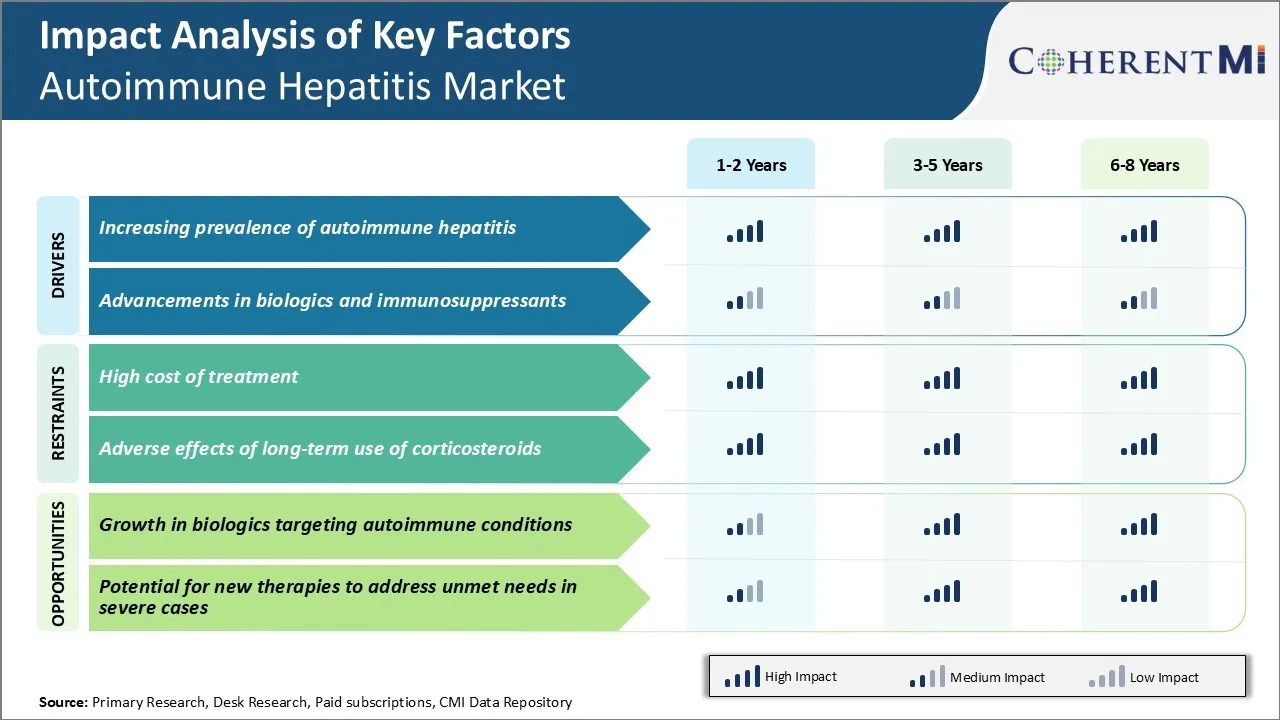Autoimmune Hepatitis Market Trends
Market Driver - Increasing Prevalence of Autoimmune Hepatitis
The autoimmune hepatitis market is witnessing significant growth in recent years owing to the rising prevalence of the disease across global populations. As per various studies conducted by leading medical institutions, it is estimated that around 2 million people worldwide are currently suffering from autoimmune hepatitis. The occurrence of this chronic inflammatory disease is more common among women as compared to men. The female to male prevalence ratio is around 3:1.
Geographically, developed regions like North America and Western Europe have witnessed a substantial rise over the last two decades. This could be attributed to better diagnostic capabilities and increased screening. However, even developing countries in Asia Pacific and Latin America are showing greater occurrences owing to widespread lifestyle transitions taking place. More cases are also coming to light in the pediatric population, necessitating effective treatment options suitable for children.
Overall, with global population growing steadily and environmental exposures on the rise, it is expected that autoimmune hepatitis prevalence will continue climbing in the long-term. This upward trend presents significant expansion opportunities for players in the autoimmune hepatitis market catering to the treatment requirement of the growing patient base worldwide.
Market Driver - Advancements in Biologics and Immunosuppressants
The autoimmune hepatitis treatment landscape has transformed significantly in recent years with the arrival of novel drug classes. Traditionally, corticosteroids along with azathioprine were the mainstay of treatment. However, their use was associated with several side effects on long-term administration. This provided a strong fillip for development of safer and more effective treatment alternatives.
Similarly, recent approvals of JAK inhibitors present additional treatment choices. By blocking the janus kinase-signal transducer and activator of transcription protein pathway, they help control hepatic inflammation and prevent flare-ups. Compared to existing options, they have milder adverse effects and better tolerability. Their once-daily oral dosing also enhances treatment compliance and convenience for patients.
Further, novel immunosuppressants focused on selective interleukin pathways have shown efficacy in clinical trials. These targeted agents suppress the immune response more precisely with less harm to other systems of the body. A stream of such pipeline molecules is expected to enter the market in the coming years.
Thus, continuous evolutions in biologic and targeted synthetic drug platforms have significantly enhanced management of autoimmune hepatitis patients. They address prior limitations and expand treatment individualization. This in turn is proving instrumental in strengthening market growth trajectories.

Market Challenge - High Cost of Treatment
One of the major challenges faced by the autoimmune hepatitis market is the high cost of treatment options available. Autoimmune hepatitis requires long term treatment and management which increases the overall cost burden on patients significantly. The standard first line treatment includes immunosuppressant drugs such as prednisone and azathioprine which are quite effective but are also very expensive. The costs of these drugs increase greatly over the course of long-term therapy.
Additionally, a significant number of patients do not respond adequately to the first line treatment or have adverse reactions. In such cases, second line treatments such as budesonide, mycophenolate mofetil or combination therapies are used which have even higher costs. The financial toxicity of long-term autoimmune hepatitis management poses severe affordability challenges for many patients. This acts as a major hindrance for treatment compliance and adherence.
High healthcare costs can negatively impact access to life-saving therapies for a proportion of the patient population. Addressing issues related to the affordability of autoimmune hepatitis treatment options is a key challenge that needs to be resolved to drive growth in this market.
Market Opportunity - Growth in Biologics Targeting Autoimmune Conditions
One of the major opportunities in the autoimmune hepatitis market is the increased focus on developing cost-effective biologics that target specific pathways involved in autoimmune diseases. There is significant research ongoing to understand the pathogenesis of autoimmune hepatitis at a molecular level to identify novel drug targets.
Several biotechnology companies and pharmaceutical giants are investing heavily in developing biologics such as monoclonal antibodies, fusion proteins etc. that selectively interfere with certain cytokines, cell surface receptors or signaling molecules implicated in causing autoimmune response. These targeted therapy options have potential to be more effective than existing nonspecific immunosuppressants with lower treatment costs.
Successful development of such precision biologics could disrupt the autoimmune hepatitis treatment landscape and drive strong growth opportunities in the future. Their market entry may help address the current limitation of high treatment expenses in autoimmune hepatitis management.